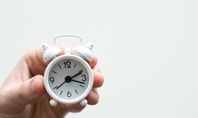Fatigue after the time changes: what you can do about summertime jet lag
Twice a year, the clock is set back or forward by one hour. Many people notice that they feel tired, sluggish and out of kilter after the clocks change – similar to the effects of jet lag. But why does a one-hour change throw our bodies out of sync? And what can you do to feel in good shape again more quickly? We explain the reasons behind this and give you practical tips to help you overcome fatigue after the time changes, sleep better and regain your energy in everyday life.
by CALIDA
October 22, 2025•3 min reading time

Tired after the time change: Get back into rhythm and enjoy restful sleep again.
Table of Contents
Why do some people suffer more when the time changes?
Tired and sluggish: how our day-to-day lives are affected when the time changes
What can you do about fatigue after the time changes?
• Adjust your sleep-wake cycle early on
• Living with the extra daylight: be active during the day, relax in the evenings
The key points
Many people feel tired and sluggish after the clocks change, as their sleep-wake cycle is disrupted.
The change from winter to summer time, in particular, creates a kind of mini jet lag, as we have to get up ‘earlier’, even though our body isn’t quite ready.
With healthy routines, plenty of daylight and good sleep hygiene, you can make the transition easier.
Why do some people suffer more when the time changes?
There are two types of people: those who hardly notice the clocks have changed, and those who feel tired and exhausted the day after daylight saving time begins. If you belong to the second group, your biorhythm may be more strongly tied to fixed times.
So when the clock is suddenly set forward an hour, your body initially remains in ‘old mode’. Your body clock tells you it’s still nighttime, even though your alarm clock is already ringing. Late risers, night owls and people with sensitive sleep patterns often feel this summertime jet lag particularly strongly – this is usually less pronounced when switching to winter time, as we are ‘given back’ an hour at the end of October.
In addition to sleep type, factors such as age, working hours, stress levels and general sleep quality also play a role. Children and older people often have greater difficulty adjusting to summer time, while younger adults react more flexibly – their sleep-wake cycle is often more irregular anyway.
Tired and sluggish: how our day-to-day lives are affected when the time changes
Many people feel the effects of the clocks changing straight away: they are tired, less productive, unfocused and sluggish. Studies have also shown that this is not just a subjective perception, observing an increase in road accidents in the days after the clocks were changed!
But it’s not just tiredness that bothers many people – mood swings, irritability or digestive problems can also occur if our internal rhythm is out of balance. And those who already suffer from sleep problems often feel the effects of changing the clock even more distinctly, even to the point of experiencing depressive moods.
What can you do about fatigue after the time changes?
Many of us are thrown off track when the clocks change. But don’t worry, you don’t have to suffer for weeks and you can also counteract the fatigue shortly after the clocks change with a few simple adjustments. We’ll show you how you can support your body and bring your mind back into balance more quickly.
Adjust your sleep-wake cycle early on
To make the change easier, you can prepare for the time change a few days in advance. To do this, go to bed 10 to 15 minutes earlier each evening and get up earlier accordingly. This way, you gradually get used to the new time without your body ‘losing’ an hour from one day to the next.
Living with the extra daylight: be active during the day, relax in the evenings
Summer and winter time exist so that the sun does not set at 4 pm in winter and rise at 4 am in summer. But in fact, very few of us still live according to the natural rhythm of the sun.
So if you’re struggling with the time change, you should make sure to spend as much time as possible outdoors during the day and to expose yourself to natural sunlight. Open the curtains early in the morning, spend your lunch break outside or exercise outdoors.
In the evening, the opposite applies: dim the lights, avoid excessive screen time and create a calm routine that helps your body relax. This makes it easier to sleep, even if the clock seems to be ‘working against you’.
Good sleep hygiene and evening routines
If you’re tired after changing the clocks, it’s worth taking a closer look at your sleep hygiene. This includes:
Regular bedtime: if possible, you should go to bed and get up at the same time even at weekends and on holiday.
A comfortable sleeping environment: make sure your bedroom is dark and quiet, with a room temperature of around 16°C to 18°C.
The right sleepwear: breathable materials such as cotton or TENCEL™ help regulate your body temperature and promote a restful night’s sleep.
Light meals in the evening: heavy food or alcohol put a strain on the digestive system and make it difficult to fall asleep. Opt for light foods and be sure to drink plenty of water.
Calming evening routines such as a yoga session, a cup of tea or a good book can also help to wind down your body and mind and prepare you for sleep.
In conclusion
For many, the physical and mental fatigue after the time changes can be a nuisance – especially after switching to summer time. But with a little preparation, the right daily schedule and a calming evening routine, you can quickly overcome this mini jet lag. Support your body with a healthy diet, plenty of daylight, a regular sleep-wake cycle and comfortable, breathable pyjamas that you feel good in.


